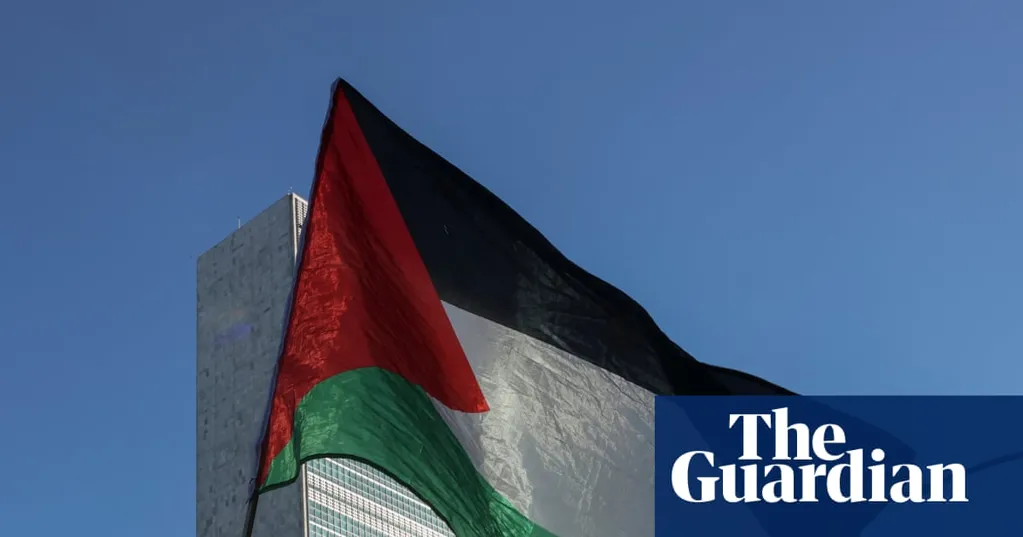Move comes as Anthony Albanese tries to secure meeting with Donald Trump and amid warnings that recognition could spark 'punitive measures' from the US
Australia has formally recognised Palestine as a sovereign and independent state, completing a landmark shift in foreign policy over the Israel-Gaza war.
The prime minister, Anthony Albanese, moved forward with formal recognition, effective from Sunday, acting in concert with similar declarations by prime ministers Keir Starmer of the UK and Mark Carney of Canada.
The plan is designed to build renewed momentum for a two-state solution in the Middle East, including a ceasefire in Gaza and the release of the hostages from the 7 October 2023 terror attacks orchestrated by Hamas.
In August, Australia said it would join the international push led by France, prompting fury from Israeli's leader Benjamin Netanyahu and possible retribution from the US president, Donald Trump.
Albanese's announcement came after he arrived in New York for the UN general assembly and a major conference on a two-state solution to the conflict between Israel and Hamas this week.
Albanese said Australia recognised "the legitimate and long-held aspirations of the people of Palestine to a state of their own". The establishment of an embassy and active diplomatic relations will flow once the Palestinian Authority meets reform commitments sought by the international community.
They include recognition of Israel's right to exist, and commitments to hold democratic elections and enact significant reform to finance, governance and education.
Governments recognising Palestine insist Hamas must have no role in any new state.
Albanese and the foreign affairs minister, Penny Wong, were at pains to stress Trump's leadership was vital to securing "a credible peace plan". They said the White House and the Arab League could champion the reconstruction of Gaza and guarantee the security of Israel.
"Australia will continue to work with our international partners to help build on today's act of recognition and to bring the Middle East closer to the lasting peace and security that is the hope, and the right, of all humanity,"
the pair said in a statement.
Trump, who opposes recognition and has threatened retaliation against Canada already, will be an outsize presence in New York this week. Albanese is trying to secure his first face-to-face meeting with the president, even as a group of 25 of his close allies warned Australia's recognition of Palestine could spark "punitive measures" from the US.
The group, including Trump loyalists Ted Cruz of Texas and Elise Stefanik of New York, wrote to Albanese, Starmer, Carney and French president Emmanuel Macron urging a rethink at the weekend.
But Israel's government is increasingly isolated on the world stage, including over its latest military offensive targeting Gaza City. The continued expansion of Israeli settlements in the occupied West Bank has also angered international leaders.
A United Nations independent international commission of inquiry found last week that genocide is occurring in Gaza.
Its report accused Netanyahu and other senior Israeli leaders of incitement of genocide. Israel's foreign ministry categorically rejected the report's finding and called for the commission's abolition.
There is no timeline yet for the international court of justice hearing into Israel's compliance with an international convention on genocide, but observers expect it is unlikely to occur before 2027.
Netanyahu has called Albanese as a "weak" leader over the moves towards recognition of Palestine, lashing out at Australian prime minister and claiming he has "forever tarnished" his reputation.
The hardline leader said recognition was wrong, because Hamas had used its power "for murder, pillage and monstrous crimes" and must not be rewarded. He has called Australia's decision "appeasement" and even compared the move to Adolf Hitler's invasion of Czechoslovakia in 1938.
Albanese has been a vocal proponent of Palestinian statehood for decades, and Labor's national platform has called for recognition to be a priority for Australian governments.
The White House moved to block senior Palestinian representatives from travelling to the UN this week for talks, denying members of the delegation visas.
The opposition leader, Sussan Ley, said Labor had extended recognition of Palestine ahead of crucial conditions being in place.
"Hamas still holds Israeli hostages, seized during the terrorist raids of 7 October 2023. Hamas is still in power in Gaza and continues to attack Israel. The Palestinian people can see no hope of democratic self-governance while Hamas is in power,"
she said.
